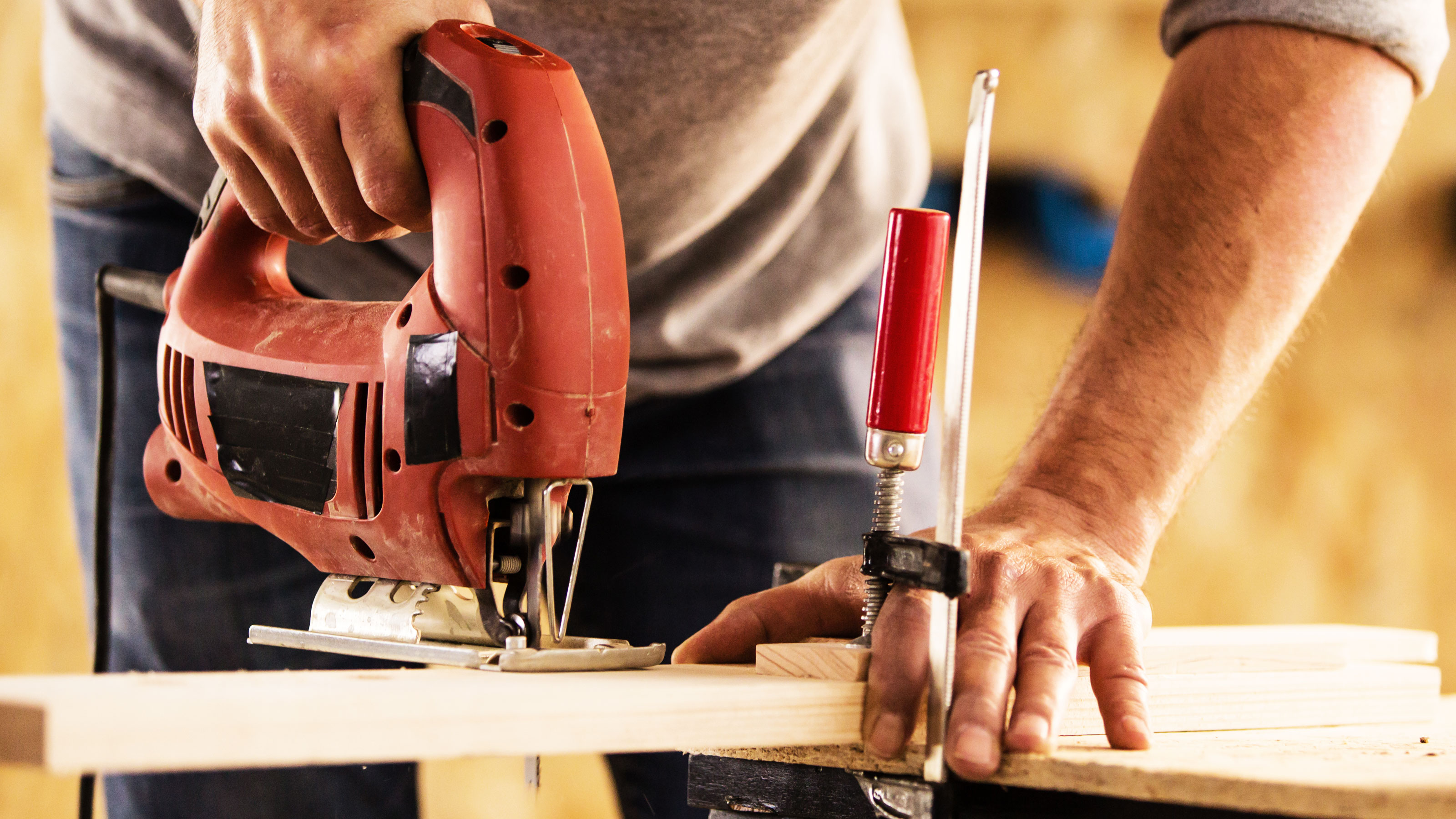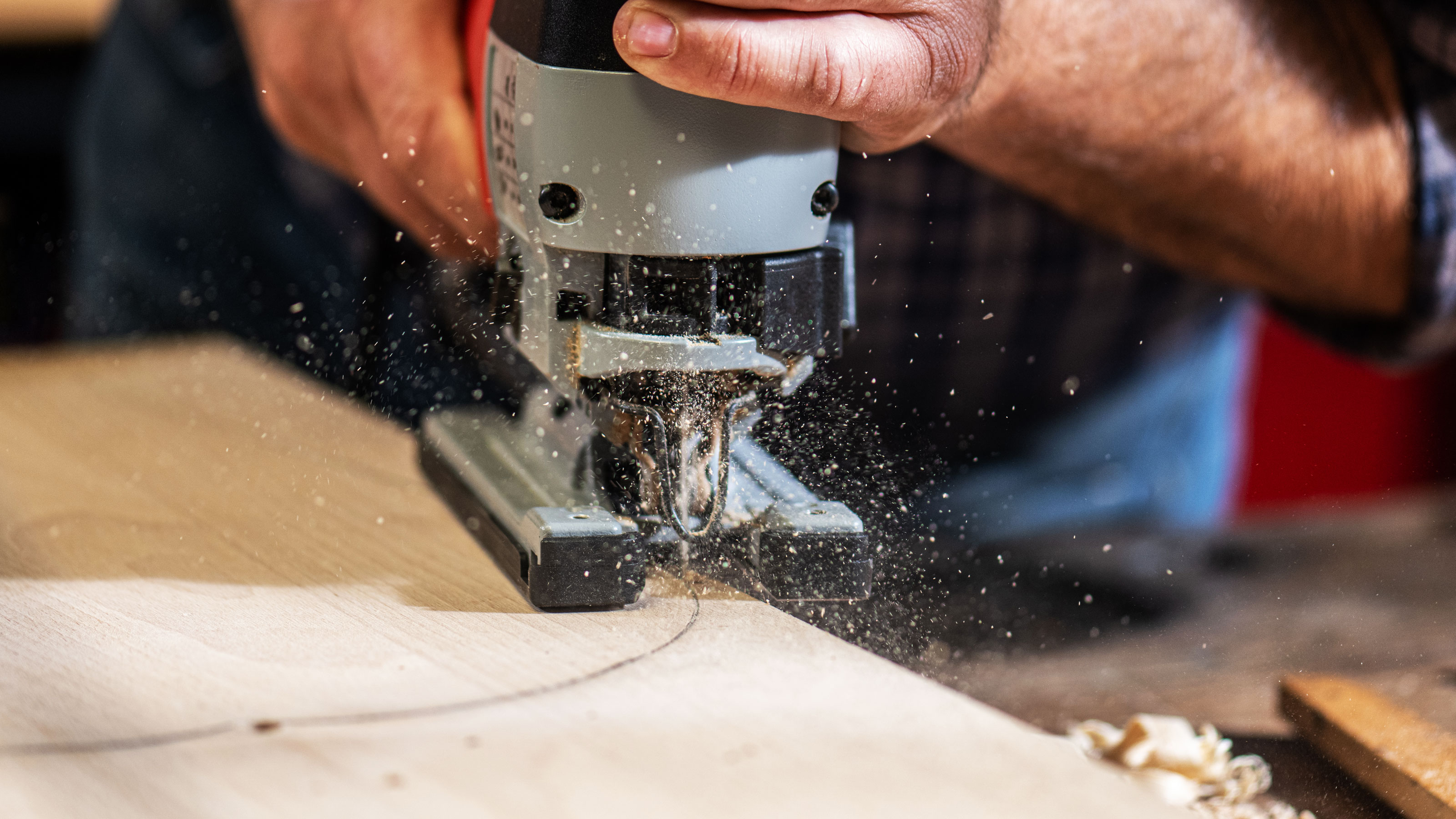What is a jigsaw? An essential power tool for DIY projects
We provide the answers to what is a jigsaw and help you decide whether you need one to tackle your next DIY or home renovation job

What is a jigsaw used for is a common question among many DIYers. Most know what a jigsaw looks like but are not so sure about how they should be used.
It is one of the types of saws that has a place in every home renovators/DIYers kit. It is a specialist and generalist power tool and can do a lot of general DIY jobs. But, it also has a special talent for specific jobs – such as cutting curves – that other power saws can’t or struggle to achieve.
Here we delve into what you can use a jigsaw for, what materials it can cut and how much you should expect to pay for one so you can decide if it is worth investing for your next DIY project.
What is a jigsaw? A quick definition
A jigsaw is a portable handheld saw that has a narrow blade that sits at the front of the body of the saw in a vertical position. This works in conjunction with a base plate known as a shoe. This keeps the jigsaw flat against whatever surface you are cutting while the blade uses an up and down sawing action to rip through whatever material you are cutting.
A large handle gives grip and control over the direction of the cut and typically integrates the on/off button, a lock on button and a speed dial. This allows you to take control of the speed of the sawing action while the lock button keeps the blade in action without you having to have your finger on the off/on button constantly. Ideal when using the saw for prolonged periods
What DIY jobs can I do with a jigsaw?
A jigsaw is the perfect tool when you need to cut more than straight lines. The flexibility in a blade makes them an ideal choice for cutting curves, circles and irregular shapes.
They are commonly used for cutting plywood, MDF, OSB and other wooden boards where you need precise curves and odd shapes, such as fitting flooring around a door frame and cut outs for pipes and sockets. They are also used to make internal cuts in worktops to place sinks or hobs.

What materials can a jigsaw cut?
A jigsaw can cut through a variety of different materials depending on what blade you are using. Wood is the popular choice for a jigsaw, but metal and plastic are also common. You can get blades that are specific to a material or invest in a set like the WORKPRO 25-piece T-Shank Jig Saw Blade Set from Amazon which cuts multiple materials.
The teeth on a jigsaw blade will also have bearing on the type of cut you will get. The general rule for saw TPI (Teeth Per Inch) is that the higher the tooth count the cleaner and slower the cut. The lower the tooth count the quicker and coarser the cut.
Typically blades are designed to cut on the up stroke, but you can get downcut blades that cut on the downstroke. These are ideal for getting cleaner cuts on worktops as the material is being pushed down rather than up.
How thick wood can a jigsaw cut?
This depends on the size of the blade. Jigsaw blades are commonly 100mm (4 inches) in length which gives a cutting depth of around 70mm or less to get a decent cut. A longer blade will have a larger cutting depth, but the longer the blade the more likely it is to break.
The density of the wood and the power of the motor can also affect the effectiveness of a cut. If you have a dense wood and a low powered motor you should only cut wood that is half – or less – the length of the blade. So if you have a 100mm blade, try not to cut anything over 50mm in depth.
Can you cut straight with a jigsaw?
A jigsaw is a free hand power tool so cutting straight lines isn't always easy. A thicker more rigid blade will help, but this doesn't guarantee a straight line. One tip is to use a guide such as a long piece of straight timber. Measure up and either screw down the timber or clamp into place.
Some jigsaws come with a parallel guide to help create straight edges – as long as the material already has a straight edge. This can also be used to create circles in sheets of wood or worktops.
How much does a jigsaw cost?
The prices on a jigsaw can vary greatly depending on what type you’re purchasing, the build quality, what motor it has and the brand. At the low end you can get a corded jigsaw for as little as £25. These are great for occasional use, but if you want a jigsaw that’s going to see a lot of action then you should be looking at the higher end of the price range. Something like the DeWALT DW331K Heavy Duty Top Handle Jigsaw from Amazon fits the bill.
If you choose to go cordless expect to pay more at both ends of the price scale, but you can get a budget model like the BLACK+DECKER 18 V Cordless Pendulum Electric Jigsaw from Amazon. This doesn’t come with a battery or charger, so remember you will need to add this to the price.
Below we have put together a quick summary of prices you can expect to pay for corded and cordless models at both ends of the scale.
| Header Cell - Column 0 | LOW | HIGH |
|---|---|---|
| CORDED | £25 | £120+ |
| CORDLESS | £50 | £200+ |
Get the Homebuilding & Renovating Newsletter
Bring your dream home to life with expert advice, how to guides and design inspiration. Sign up for our newsletter and get two free tickets to a Homebuilding & Renovating Show near you.
Steve Jenkins is a freelance content creator with over two decades of experience working in digital and print and was previously the DIY content editor for Homebuilding & Renovating.
He is a keen DIYer with over 20 years of experience in transforming and renovating the many homes he has lived in. He specialises in painting and decorating, but has a wide range of skills gleaned from working in the building trade for around 10 years and spending time at night school learning how to plaster and plumb.
He has fitted kitchens, tiled bathrooms and kitchens, laid many floors, built partition walls, plastered walls, plumbed in bathrooms, worked on loft conversions and much more. And when he's not sure how to tackle a DIY project he has a wide network of friends – including plumbers, gas engineers, tilers, carpenters, painters and decorators, electricians and builders – in the trade to call upon.

